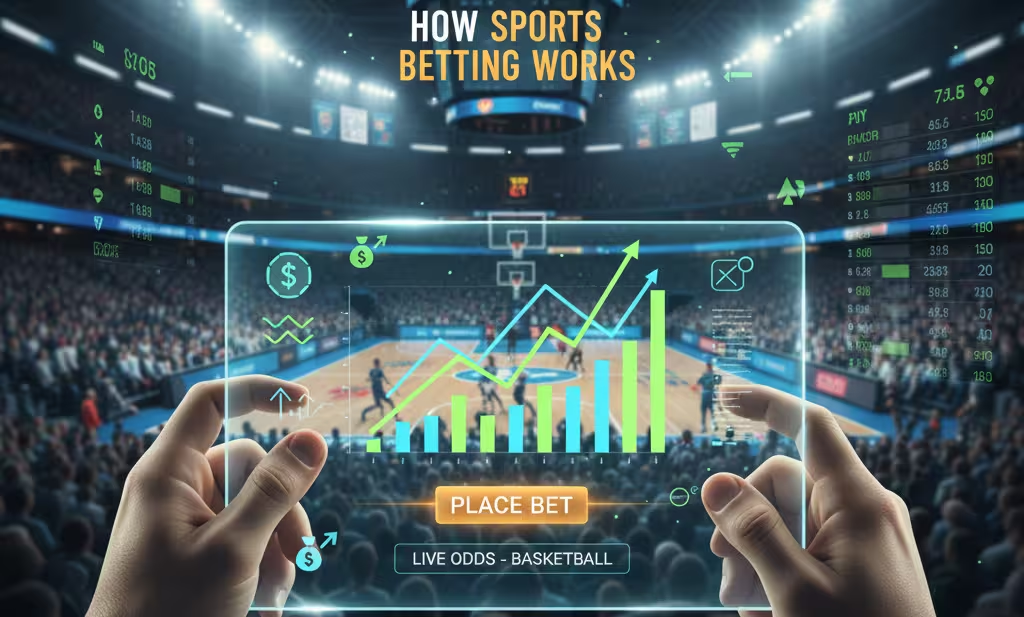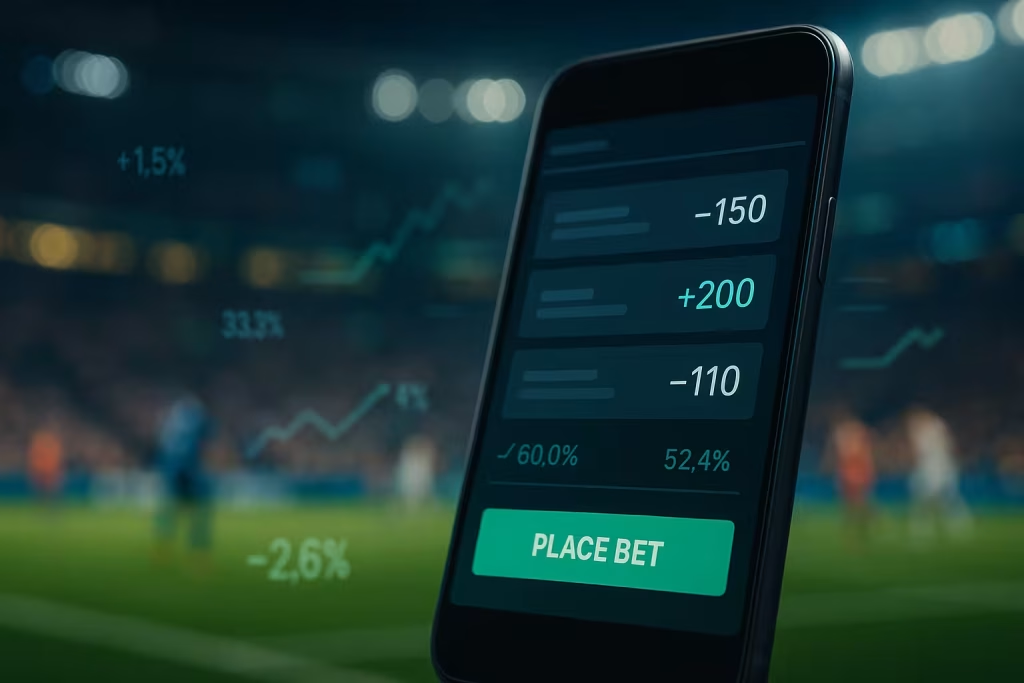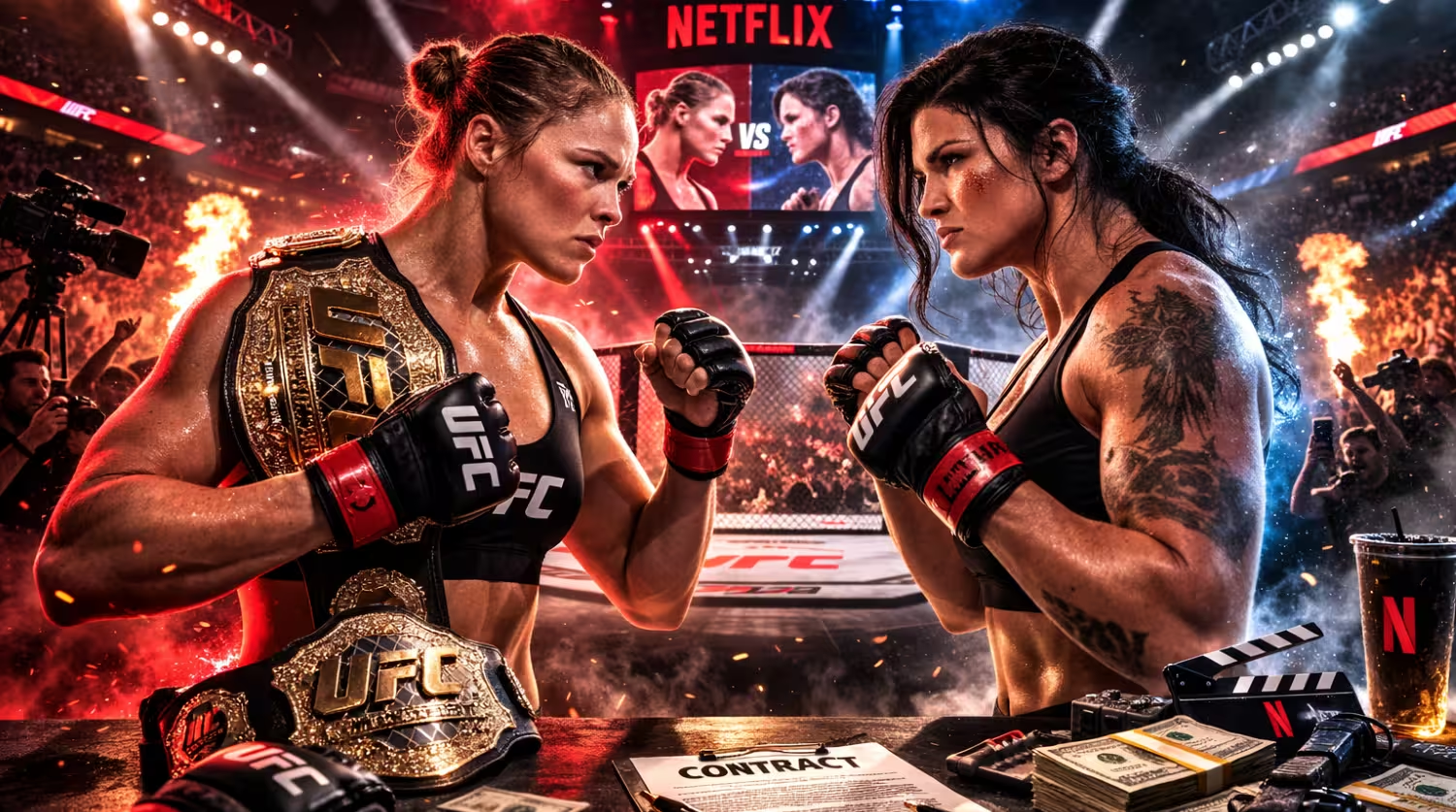How Sports Betting Works: A Simple, Modern Guide for 2026

Sports betting looks simple from the outside — pick a team, place a bet, hope for the best. But once you peel back the first layer, you quickly realize there’s a whole system working underneath. Odds shift. Lines move. Payouts change. And sportsbooks always seem to know something the rest of us don’t.
That’s where most beginners get stuck. They win a few bets, lose a few more, and start wondering what actually drives the numbers they see on their betting app. Why does a spread jump from -3.5 to -5 overnight? Why does a player prop suddenly drop before kickoff? And how are sportsbooks so good at setting lines that look “just right” every single time?
The truth is this: sports betting makes a lot more sense once you understand how it works behind the scenes. There’s a structure to everything — the odds, the point spreads, the algorithms that set the lines, and even the promotions you’re offered.
This guide breaks it all down in clear, simple language. Whether you’ve never placed a bet or you’re trying to sharpen your skills, you’ll learn exactly how modern sports betting works today — and what you need to know to bet with confidence, not confusion.
Ready to see the game differently? Let’s get started.
What Sports Betting Actually Is
At its core, sports betting is simply putting money behind a prediction. You pick an outcome you believe will happen in a game — a team winning, a player scoring, a total going over — and the sportsbook pays you if you’re right. That sounds basic, but modern sports betting has evolved into a fast-moving marketplace built on data, probabilities, and constant updates.
A sportsbook’s job isn’t to predict the future perfectly. Their real goal is to set odds that attract balanced action on both sides of a wager. When that happens, the sportsbook makes money through the fee built into every line (called the juice or vig), regardless of who wins the game. That’s why lines move, odds shift, and numbers change — the market is always reacting.
Today’s sports betting experience is more dynamic than ever. You can bet from your phone, build same-game parlays, wager live as the action unfolds, and choose from hundreds of props for almost any game. It’s quick, customizable, and designed to keep you engaged.
Beginner-Friendly Concepts to Understand Early
- Odds: Show how likely an outcome is and how much you can win.
- Markets: Different types of bets you can make (spread, total, props, etc.).
- Favorites & Underdogs: Indicated by minus and plus odds.
- Juice (Vig): The small built-in fee sportsbooks charge on most bets.
- Line Movement: Odds shifting based on news, betting volume, and market activity.
If you’re new to the terminology, you can browse our full Sports Betting Glossary.
A clear understanding of these basics will make everything else in sports betting much easier to grasp.
How Odds Work (American Odds Explained Simply)

Odds are the foundation of sports betting. They tell you two important things:
- How likely an outcome is, and
- How much money you stand to win.
Most U.S. sportsbooks use American odds, which are displayed with a plus sign (+) or a minus sign (−). Once you understand what those symbols mean, reading lines becomes much easier.
Positive Odds (+150, +200, +350)
Positive odds represent the underdog. The bigger the plus number, the less likely the sportsbook believes that outcome is — and the more money you can win.
Example: +150 → A $100 bet wins $150 profit.
Negative Odds (-120, -160, -210)
Negative odds represent the favorite. The larger the negative number, the more likely that outcome is — but the more you must risk to win the same amount.
Example: -150 → You must bet $150 to win $100 profit.
Implied Probability (The Math Behind the Odds)
Odds can also be converted into a rough percentage that shows how likely the outcome is based on the sportsbook’s model.
-200 odds imply around a 66.7% chance
+200 odds imply around a 33.3% chance
It’s not exact science, but it helps you understand whether the odds match what you believe will happen — which is the heart of finding value.
Why Odds Move (Line Movement 101)
Odds are never static. They shift based on updates and market pressure. Sometimes they move slowly; other times they jump in seconds.
Here are the most common reasons odds move:
- Injury news
- Weather changes
- High betting volume
- Sharp (professional) bettors taking a side
- New information such as lineups or coaching changes
- Algorithms adjusting in live betting
When reports or sharp action hits the market, sportsbooks adjust to protect themselves.
For a Deeper Dive Into Odds & Lines
If you want a more in-depth look at how odds work, how to calculate payouts, and how line movement really functions, check out our full guide here.
Understanding odds is one of the most valuable skills a bettor can learn. Once you grasp how favorites, underdogs, and implied probability work, everything else in sports betting becomes much clearer.
The Most Common Sports Bets
Modern sports betting gives you dozens of ways to wager on a game. Some bets are simple and beginner-friendly. Others are designed for people who want to build creative plays, use stats, or take advantage of in-game momentum. Understanding these core bet types will make almost every sportsbook screen feel easier to navigate.
| Bet Type | What You’re Betting On | Skill Level | Best For |
|---|---|---|---|
Moneyline | Who wins the game outright | Beginner | Simple predictions |
Point Spread | Margin of victory/defeat | Beginner–Intermediate | Most major sports |
Total (Over/Under) | Combined final score | Beginner | Betting game flow |
Props | Player/team stats & events | All levels | Personal player research |
Parlays & SGPs | Multiple bets combined | Beginner–Advanced | High-risk, high-reward |
Futures | Season-long outcomes | Beginner | Long-term rooting interest |
Live Betting | Real-time wagers during the game | Intermediate–Advanced | Fast action, in-game edge |
Moneyline (Who Wins, Plain and Simple)
Moneyline betting is the easiest to understand. You’re simply picking the winner.
- Negative odds (−) = the favorite
- Positive odds (+) = the underdog
Example: Yankees -160 vs. Red Sox +140
You need to risk more on the favorite to win the same amount you’d win betting the underdog.
This is the bet type most new bettors start with — no spreads, no math, just picking a winner.
Point Spread (The Great Equalizer)
The point spread is designed to make the matchup feel “even.”
- Favorites must win by more than the spread
- Underdogs can win outright or lose by fewer points
Example:
Chiefs -6.5
Raiders +6.5
If the Chiefs win by 7 or more, they “cover.” If the Raiders lose by 6 or less (or win), they cover.
Most NFL and NBA betting volume comes from spreads because they’re strategic and well-balanced.
Totals (Over/Under)
With totals, it doesn’t matter who wins. You’re betting on the combined final score.
Example: Lakers vs. Suns — Over/Under 224.5 points
- Bet the Over if you expect a high-scoring game
- Bet the Under if you expect a slower, defensive game
Totals are popular across NFL, NBA, MLB, NHL, soccer, and UFC.
Props (Player & Team Props)
Props are bets on specific events rather than the final score. Thanks to same-game parlays, props have exploded in popularity.
Examples:
- Patrick Mahomes Over 2.5 passing TDs
- Luka Dončić Over 29.5 points
- Yankees team total Over 4.5 runs
- “Will Player X score a touchdown?”
Props give you endless flexibility — and they’re often softer markets because they rely on player tendencies, matchups, and situational trends.
Parlays & Same-Game Parlays (SGPs)
Parlays combine multiple bets into one ticket. Every leg must win.
Example:
- Chiefs moneyline
- Mahomes Over 275.5 passing yards
- Kelce Anytime TD
If any leg loses, the entire parlay loses. The risk is higher — but so is the payout.
SGPs let you build correlated parlays within the same game, such as pairing passing yards, receiving yards, and touchdown props. Modern sportsbooks heavily promote them because casual bettors love the upside.
Futures (Season-Long Bets)
Futures are long-term wagers with big-picture outcomes.
Popular future bets include:
- Super Bowl winner
- NBA MVP
- Rookie of the Year
- Team win totals
- Division winner
These bets are fun because they give you something to follow all season long.
Live Betting (In-Game Betting)
Live betting lets you wager while the game is happening. Odds update instantly based on momentum, injuries, scoring runs, and advanced algorithms.
Examples of live bets:
- Next drive result
- Next point scorer
- Updated spread or total
- Player props that change throughout the game
Micro-betting — wagers on very small, fast events — is one of the fastest-growing parts of sports betting in 2026.
How Sportsbooks Actually Set Lines

Most people think sportsbooks create lines by picking who they believe will win the game. That’s not actually the case. Sportsbooks aren’t trying to predict the future — they’re trying to predict where the money will go.
Their real goal is simple: Create a number that attracts balanced betting on both sides.
When the money is evenly split, the sportsbook makes a profit from the juice (vig) no matter which team wins.
To do this, they rely on a mix of powerful data models, expert oddsmakers, and constant market monitoring.
How the Opening Line Is Created
Before a game is posted on the board, sportsbooks use internal rating systems to create an initial number. These are often called power ratings — a numeric value assigned to every team that reflects performance, injuries, matchups, and overall strength.
That number becomes the “opening line.”
This early line is usually softer because it’s created with limited info and before large amounts of betting action begin to shape the market.
Factors Sportsbooks Use to Set Lines
Sportsbooks don’t rely on gut feeling. They use a large combination of objective data, algorithms, and expert inputs.
The biggest influences include:
- Team power ratings
- Injuries & roster changes
- Matchup history
- Advanced analytics (EPA, pace, efficiency ratings, etc.)
- Home-field advantage
- Rest, travel, and schedule spots
- Weather (NFL, MLB, outdoor events)
- Public perception & likely betting patterns
These factors shape the first version of the line — but real movement starts once bettors get involved.
Why Lines Move (And Who Moves Them)
Once a line is posted, sportsbooks watch how bettors respond. The earliest bets usually come from professional bettors (“sharps”), who can influence the market almost immediately.
If sharp bettors hammer one side, the sportsbook shifts the line to protect themselves and encourage money on the opposite side. This keeps the action balanced.
Common reasons lines move:
- Sharp action
- Breaking injury news
- Weather changes
- Public betting trends
- Algorithmic live updates
- Major market corrections
- Book liability (too much money on one side)
Oddsmakers adjust lines right up until the moment the game starts, creating what’s known as the closing line — widely considered the most accurate reflection of true odds.
Opening Line vs. Closing Line
The opening line is the sportsbook’s first estimate. The closing line is the final, most efficient version before kickoff or tipoff.
Sharp bettors value closing line value (CLV) — meaning they bet early and try to beat the final number. If you consistently beat the closing line, you’re doing something right.
How Sportsbooks Really Make Money: The Juice (Vig)
Sportsbooks build a small fee into most wagers. That’s why both sides of a spread are often -110 instead of +100.
That extra 10 cents is the vig — and it’s how the sportsbook keeps a long-term edge.
You’ll notice higher vig in markets with:
- Player props
- Popular public games
- Same-game parlays
- Correlated markets
- Low-information matchups
Even small juice differences add up over time.
Sportsbooks set lines with math, adjustments, and market pressure — not luck. Once you understand how these numbers are created and why they move, you’ll see the betting board in a whole new way and start to recognize value most people miss.
How Payouts Work
Once you understand odds, the next step is knowing how much money you can actually win. Payouts in sports betting are based entirely on the odds attached to your wager. The odds tell you how much profit you’ll earn plus how much total money you’ll get back if the bet wins.
Your total return always includes:
- Your original stake, and
- Your profit, based on the odds.
Let’s break it down in simple, real-world terms.
Payouts With Positive Odds (+)
Positive odds are underdog odds. The number shows how much profit you’d make from a $100 bet.
Example: +150 → A $100 bet wins $150 profit
Total return = $250 ($150 profit + $100 stake)
This means higher underdog numbers = higher potential payouts.
Payouts With Negative Odds (–)
Negative odds are favorite odds. The number shows how much money you must bet to win $100 profit.
Example: -150 → Bet $150 to win $100 profit
Total return = $250 ($100 profit + $150 stake)
The bigger the negative number, the lower the payout relative to risk.
Quick Payout Cheat Sheet
| Odds | Profit on $100 Bet | Total Return |
|---|---|---|
+100 | $100 | $200 |
+150 | $150 | $250 |
+200 | $200 | $300 |
-110 | $90.90 | $190.90 |
-150 | $66.67 | $166.67 |
-200 | $50 | $150 |
(These aren’t exact to the penny in every book, but they’re close enough to help you visualize the payout.)
How Parlays Pay Out
Parlays multiply the odds from each leg together, which creates the larger payout. If even one leg loses, the entire ticket loses.
Example Parlay:
- Leg 1: -110
- Leg 2: +120
- Leg 3: -105
The sportsbook combines the implied probabilities from each leg to calculate the final parlay payout. This is why parlays can balloon into huge multipliers — but also why they’re so difficult to hit consistently.
What Happens When a Bet Pushes?
A push happens when a bet lands exactly on the line.
Examples:
- Spread: -3 loses/wins by exactly 3
- Total: Over/Under 44 ends at 44
If a bet pushes, the sportsbook refunds your stake. For parlays, the pushed leg is removed and the odds adjust accordingly.
Live Betting Payouts
Live (in-game) betting uses constantly changing odds. Your payout is based on the exact odds at the moment you click “Confirm.” If the line changes during that second, you may get a notification asking you to accept or reject the new odds.
Cash-Out Payouts
Many sportsbooks now let you “cash out” early. This gives you a guaranteed payout — usually less than the full potential amount — before the event ends.
You’ll typically get a higher cash-out amount when your bet is trending well, and a much lower one when the sportsbook believes your bet is likely to lose.
Understanding payouts is key because it helps you compare risk vs. reward. Once you’re comfortable with how profit, stake, and odds work together, you’ll be able to size your bets smarter and read the betting board with a lot more confidence.
The Modern Sports Betting Experience in 2026

Sports betting today looks nothing like it did even five years ago. What used to require a physical sportsbook or a long list of complicated odds is now as simple as opening an app on your phone and choosing from hundreds of betting options in seconds. The experience is faster, more personalized, and packed with features designed around how people actually watch sports today.
The best online sportsbooks don’t just take bets — they act like full entertainment hubs. They give you real-time stats, suggested wagers, same-game parlay builders, live odds that update instantly, and personalized promotions that fit your betting style. Everything is designed to feel smooth, intuitive, and interactive.
Mobile Betting Apps: The Center of Everything
In 2026, nearly all betting happens on mobile. The apps are clean, fast, and built to get you from idea to bet slip quickly. They offer:
- One-tap moneylines, spreads, and totals
- Same-game parlay builders
- Custom player prop menus
- Real-time stat tracking
- Personalized bet suggestions
- Odds boosts and profit boosts
- Live-streamed events (on select sportsbooks)
Most users never visit a desktop sportsbook anymore — the phone experience is simply easier.
Promotions, Boosts & Bonuses
Sportsbooks compete aggressively for customers, which means bettors see a constant wave of bonuses:
- Odds boosts
- Profit boosts
- Bet insurance (refunds on losses)
- Deposit matches
- Parlay boosts
These offers are designed to look appealing, but they always come with terms and conditions — such as minimum odds requirements, rollover rules, or limited bet types.
Modern bettors have learned to check the fine print before assuming a promo is a guaranteed advantage.
Cash-Out Features
The cash-out option is now one of the most popular tools in betting apps. It allows you to take an early payout before the event ends.
Cash-outs are helpful when:
- Your bet is winning, but momentum is shifting
- A key player gets hurt
- You want to secure profit on a parlay
- You don’t feel confident waiting until the final whistle
Just remember: sportsbooks don’t offer cash-outs out of generosity. They offer them because it shifts risk back onto the bettor. Smart bettors use this feature wisely instead of impulsively.
AI-Driven Insights and Smart Betting Tools
Modern sportsbooks and third-party tools rely heavily on AI and real-time analytics.
Bettors today use:
- AI-powered predictions
- Real-time win probability charts
- Advanced matchup breakdowns
- Trend analysis
- Line movement trackers
- Player prop recommendation tools
- Personalized bet suggestions based on past behavior
Live Betting & Micro-Betting
Live betting has become one of the fastest-growing areas in the industry. Odds update every second, driven by advanced algorithms and real-time data feeds.
Examples of live bets:
- Next drive result
- Next basket scorer
- Result of current at-bat
- Updated spreads/totals
- Player props that adjust by the minute
Micro-betting — ultra-fast wagers on small moments — fits perfectly with how fans consume sports in 2026: fast, bite-sized, and always in motion.
Personalization & User Experience
Sportsbooks now tailor the app to each user. You might see:
- Personalized prop suggestions
- Trends based on your favorite teams
- Custom odds boosts
- Notifications for lines you’re following
- Instant alerts when a player you bet on is ruled out
This level of customization keeps users engaged and increases retention — but also makes the betting experience feel smoother and more intuitive.
The modern sports betting experience in 2026 isn’t just about placing bets — it’s about interacting with the game in real time, getting smarter insights, and using betting tools that make betting easier and more enjoyable. The combination of mobile apps, AI tools, live data, and personalized features has completely reshaped the way people bet today.
Sharp vs. Recreational Betting — Why It Matters
Sports betting is filled with different types of bettors, but almost everyone falls into one of two groups: recreational bettors or sharp bettors. Understanding the difference doesn’t mean you need to become a “pro,” but it will help you avoid the traps most casual bettors fall into — and give you a clearer idea of how to bet smarter.
The truth is, sportsbooks set lines with both groups in mind. Recreational bettors drive volume. Sharps shape the market. Together, they create the betting ecosystem you see every day inside your sportsbook app.
Here’s what separates the two — and why it matters for anyone who wants to improve.
How Recreational Bettors Think
Recreational bettors make up the vast majority of the market. They bet for fun, entertainment, and emotional reasons — often without much strategy behind their choices.
Recreational bettors typically:
- Bet heavy favorites (teams they trust)
- Follow trends blindly (“They’re hot, so they’ll win”)
- Bet with emotion, not data
- Chase losses after bad nights
- Rely heavily on parlays for big payouts
- Follow “public sides” they see on social media or TV
- Bet right before the game starts (when lines are sharpest)
Books know this. That’s why they shade popular teams, boost attention-grabbing parlays, and tailor promos to casual patterns.
There’s nothing wrong with being a recreational bettor — as long as you understand the difference between fun bets and strategic bets.
How Sharp Bettors Think
Sharp bettors are the opposite. They’re disciplined, data-driven, and focused on long-term profit rather than short-term entertainment.
Sharps typically:
- Bet early to get soft opening lines
- Track and seek closing line value (CLV)
- Look for mispriced odds (value)
- Bet numbers, not teams
- Fade public overreactions
- Use injury reports and lineup news immediately
- Manage their bankroll with strict rules
- Rarely chase losses
- Focus on efficient markets where they have an edge
Sharps fill the market with action that forces sportsbooks to correct their lines. That’s why betting early in the week (NFL), early in the day (NBA props), or before the market settles often gives smarter bettors a real advantage.
Why the Difference Matters for You
You don’t need to become a professional bettor to learn from sharp habits. Even adopting one or two sharp behaviors can dramatically improve your results over time.
Key lessons recreational bettors can borrow from sharps:
- Don’t bet solely based on emotion
- Compare odds across multiple sportsbooks
- Avoid chasing losses
- Use bankroll rules like 1–3% unit sizing
- Pay attention to line movement
- Join the market early whenever possible
- Focus on value, not flashy parlays
Sportsbooks expect recreational bettors to make certain decisions. The more you understand those patterns, the easier it becomes to avoid them.
The Middle Ground: Smart Recreational Bettors
Most bettors won’t turn into full-time sharps — and they don’t need to. The goal for many readers is to become a smart recreational bettor who enjoys betting while also giving themselves the best chance to win.
Smart recreational bettors:
- Use basic analytics
- Bet fewer, higher-quality plays
- Use tools (Bet Tracker, AI insights, line comparison)
- Understand variance and avoid emotional swings
In other words, they blend entertainment with strategy — and that’s a great place to be.
Understanding the difference between sharp and recreational betting helps you see the larger picture of how sportsbooks operate, how lines move, and how your own habits shape your results. When you start thinking just a little more like a sharp, even without going all-in, the betting experience becomes clearer, calmer, and a lot more sustainable.
Bankroll Management Basics (Beginner-Friendly)

If you only take one lesson from this entire guide, let it be this one: bankroll management is the most important part of sports betting. Not odds. Not bet types. Not hot streaks. Your bankroll — and how you use it — determines how long you survive in the betting world.
Even great bettors lose bets. Even the best picks go cold. Without a structured plan, a single bad night can wipe out an entire week of progress. With a plan, you stay steady, avoid emotional betting, and make decisions with a clear mind.
The good news? You don’t need complex formulas. A few simple rules can completely change your results.
The 1–3% Rule: The Golden Standard
Most professional and disciplined bettors use a method called unit betting—and each unit is usually between 1% and 3% of their total bankroll.
Example:
If your bankroll is $1,000:
- 1% unit = $10
- 2% unit = $20
- 3% unit = $30
This keeps losses manageable and prevents emotional “all-in” thinking.
What Is a Unit?
A unit is a standard bet size you stay consistent with. Instead of saying “I bet $25,” you say “I bet 1 unit.”
Why it matters:
- Helps track performance
- Removes emotion
- Makes it easier to compare results
- Keeps you from raising stakes in a losing streak
Once you choose a unit size, stick with it until your bankroll grows or shrinks significantly.
Why Chasing Losses Destroys Bankrolls
Chasing is when you increase your bets after losing to “win it back.”
It’s the fastest way to drain an account because:
- You’re betting emotionally
- You’re risking more with worse judgment
- You’re often betting at the worst possible odds (right before game time)
Sharp bettors never chase. They accept losses as part of the long-term process.
Smart Bankroll Rules to Follow
Here are simple habits every bettor should adopt:
- Set a monthly or season-long bankroll (your budget).
- Use 1–3% unit sizing for every standard bet.
- Never raise your unit out of emotion.
- Limit parlays (high variance = bankroll swings).
- Track every bet to understand trends and mistakes.
- Avoid betting heavily on one game or event.
- Take breaks after bad days—don’t force action.
- Bet logically, not based on frustration or thrill.
These rules sound basic, but they’re the difference between someone who lasts and someone who burns out.
How Bankroll Management Helps You Think Long-Term
Bankroll management creates clarity. Instead of asking: “Can I win big tonight?”
You start asking: “Am I making +EV decisions over time?”
It slows down emotional impulses and makes each bet feel more intentional.
This mindset shift helps you:
- Make better decisions
- Survive losing streaks
- Stay consistent during hot streaks
- Treat betting more like strategy, less like gambling
Even if you only adopt a few of these habits, you’ll immediately see more control and less stress in your betting life.
Why Most Bettors Ignore This — And Why You Shouldn’t
Most recreational bettors skip bankroll strategy because they want instant excitement. But skipping bankroll management is like racing without brakes — eventually, something goes wrong.
Betting becomes far more enjoyable when you aren’t risking too much or stressing over every outcome.
Following a simple, consistent bankroll plan is what separates smart bettors from emotional ones. Once you lock in your bankroll, define your unit size, and stick to the process, the rest of sports betting becomes much easier to manage.
Responsible Betting & the Legal Landscape
Sports betting in the United States has grown fast, but that growth comes with rules, regulation, and personal responsibility. The modern betting world is safer and more structured than ever before — as long as you know how to navigate it.
Understanding where betting is legal, how sportsbooks operate, and what tools exist to help you stay in control is just as important as learning odds and betting strategy. This section gives you a simple, honest look at what every bettor should know.
Where Sports Betting Is Legal
Since the U.S. Supreme Court overturned PASPA in 2018, states have been allowed to legalize sports betting individually. As of 2026, most states offer some form of legal sports wagering, whether online, in-person, or both.
While every state has its own rules, legal sportsbooks must follow strict guidelines related to:
- Identity verification
- Secure transactions
- Geolocation technology
- Responsible gambling tools
- Data protection and fair play
- State licensing and oversight
This means that when you bet with legitimate operators like FanDuel, DraftKings, BetMGM, Caesars, or ESPN BET, you’re using platforms that are heavily regulated and monitored for safety.
If you’re unsure whether your state allows online betting, check your state’s gaming commission or our US Online Gambling Laws page — they’ll tell you instantly if you can bet legally.
Why Betting Responsibly Matters
Sports betting should be fun, strategic, and exciting — not stressful or overwhelming. Knowing how to set limits and use the tools available will help you stay in the driver’s seat.
The biggest risk most bettors face isn’t the games themselves; it’s emotional decision-making. After a loss, many bettors feel pressure to win it back quickly. After a big win, they start raising stakes and taking unnecessary risks.
Responsible betting removes that pressure by giving you a framework you can rely on.
Popular Responsible Gambling Tools You Can Use
All legal sportsbooks in 2026 provide built-in tools to help you stay in control. These features are easy to access and extremely helpful for bettors at any level.
Here are the most common tools available:
- Deposit limits – Set how much money you can add to your account daily, weekly, or monthly.
- Wagering limits – Control how much you can bet within a time period.
- Time limits – Automatically lock the app after you’ve been active for a set amount of time.
- Cool-off periods – Temporarily pause your account for a few days or weeks.
- Self-exclusion – Long-term removal from all sportsbooks in your state if needed.
- Account activity summaries – Track your wins, losses, deposits, and time spent.
- Reality checks – On-screen reminders about how long you’ve been active.
Using these tools isn’t a sign of weakness. It’s what smart bettors do to stay in control and maintain a healthy relationship with gambling.
How to Bet Safely and Stay in Control
Responsible betting is about staying aware, disciplined, and grounded — no matter how the results fall. Here are some simple habits that help every bettor:
- Bet with money you can afford to lose
- Stick to your bankroll and unit size
- Avoid betting when tired, stressed, or emotional
- Don’t force action when there are no good spots
- Treat betting like entertainment, not income
- Take breaks during losing stretches
- Celebrate wins without letting them inflate your confidence
The goal is to enjoy the experience while keeping your financial and emotional health steady.
Your Safety as a Bettor Comes First
Every sportsbook wants your business. But only regulated sportsbooks are required to protect you.
Betting legally gives you:
- Safer deposits and withdrawals
- Guaranteed payouts
- Access to responsible gambling tools
- Dispute resolution through state regulators
- Clear rules, transparent odds, and verified data
Illegal or offshore books don’t offer these protections — which is why U.S. bettors are strongly encouraged to stay within licensed markets.
Sports betting can be incredibly fun when approached with the right mindset and safeguards. When you combine smart bankroll management with responsible betting tools and an understanding of the legal landscape, you set yourself up for a long, healthy, and enjoyable betting journey.
Final Thoughts: Seeing the Game Through a Smarter Lens
Sports betting seems complicated until you understand how all the pieces fit together — odds, lines, payouts, bet types, line movement, and bankroll management. Once those concepts click, the whole world of betting starts to feel more predictable, more strategic, and far less overwhelming.
The real advantage isn’t knowing every statistic or gambling trend. It’s understanding how sportsbooks think, how the market reacts, and how to keep your bankroll steady over the long term. When you approach betting with clarity instead of emotion, you start seeing opportunities most casual bettors simply overlook.
Whether you’re here to make the games more exciting or you’re serious about sharpening your strategy, the smartest thing you can do is keep learning. Explore different bet types. Study why lines move. Track your results. Use the tools available — including AI insights, bet trackers, and responsible gambling features — to make better decisions every week.
Sports betting doesn’t have to be a guessing game. When you understand how it works, you get to enjoy the highs, survive the lows, and approach every bet with confidence instead of confusion.
Ready to dive deeper? Check out our sports betting guide which has section on spreads, moneylines, live betting, and more to continue leveling up your game.

Alyssa contributes sportsbook/online casino reviews, but she also stays on top of any industry news, precisely that of the sports betting market. She’s been an avid sports bettor for many years and has experienced success in growing her bankroll by striking when the iron was hot. In particular, she loves betting on football and basketball at the professional and college levels.








